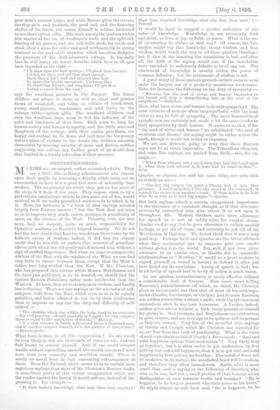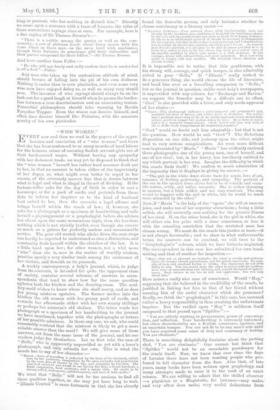SENTENTIOUSNESS.
MAXIMS are, we suspect, rather overrated affairs. They are a little like ordinary schoolmasters who impose upon their pupils by assuming a dignity which turns out on examination to have in it a good deal more of solemnity than wisdom. The magisterial air which they put on has more of
the stage in it than of the sage. They impose upon us by a pretentious omniscience which, in nine cases out of ten, would mislead us if we really permitted ourselves to be taken in by it. Here, for instance, is "a book of wise sayings selected largely from Eastern sources ; " but the East does not seem to us to improve very much, unless, perhaps, in grandiosity of mien, on the wisdom of the West. Polonius, with his wise saws, had, we suspect, quite as much responsibility for Ophelia,'s madness as Hamlet's feigned insanity. We do not feel the least doubt that Laertes was driven from borne by his father's excess of wisdom ; indeed, it did him the utmost credit that he was able to endure that cataract of grandiose advice with which the old gentleman dismissed him, without a sign of unfilial impatience. But when we come to compare the wisdom of the East with the wisdom of the West, we can find very little to choose between them, except that the West is rather less long-winded than the East. If Mr. Clouston, who has prepared this volume which Messrs. Hutchinson and Co. have just published, is to be trusted, we should find the various Eastern Poloniuses rather more intolerable than the Western. At least, they are certainly more verbose, and hardly less irritating. There are two sayings on the necessity of self- conquest, both from the East, which seem to us to be equally pointless, and better adapted to vex us by their irrelevance than to impress on any one the duty and difficulty of self- control "The enemies which rise within the body, hard to be overcome —thy evil passions—should manfully be fought : be who conquers these is equal to the conquerors of worlds."—Bharavi.
"If a man conquer in battle a thousand times a thousand men, and if another conquer himself, he is the greater of conquerors!" —Dhammapada.
What force is there in all this exaggeration ? No one would be very likely to win his thousands of victories who had not first learnt to control himself. And if one could conquer worlds without controlling oneself, the worlds conquered must have been very cowardly and worthless worlds. There is surely no moral force in such unmeaning extravagances as these. Even the Talmud, which seems to us to contain more sagacious sayings than most of Mr. Clouston's Eastern books, is sometimes guilty of this violent exaggeration which sets
the reader against the lesson it would enforce, instead of im- pressing it. For example :— "If thou laokest knowledge, what hast thou then acquired ? Haat thou acquired knowledge, what else dost thou want " ?— Talmud.
It would be hard to suggest a greater caricature of the value of knowledge. Knowledge is not necessarily food and drink, or love, or joy, or faith, or peace. What is the use of overstating its claims in that way? Of course, the Tal- mudist might say that knowledge meant wisdom, and that wisdom would teach the way to all these greatest blessings ; but if that is the meaning, the translation is bad, and after all, the drift of the saying would not, if the translation were amended, be sufficiently definite to be of any use. The attainment of knowledge is usually within the power of common industry; but the attainment of wisdom is not.
A great many of these ancient proverb-writers seem to us to. make the largest use of a perfectly monstrous irrelevance. Take, for instance, the following on the duty of sympathy :— Whoever has the seed of virtue and honour implanted in his breast will drop a sympathising tear on the woes of his neighbour."—Nakhsltabi.
Now, what have virtue and honour to do with sympathy ? The most virtuous of men are often unsympathetic, while the least virtuous may be full of sympathy. The most honourable of upright men are certainly not made a bit the more tender in their sympathies by their honour. It seems to us that, if for " the seed of virtue and honour" we substituted "the seed of weakness and shame," the saying might be rather nearer the mark, though it would not sound so imposing.
We are not, however, going to deny that these Eastern sages can be at times impressive. The Talmudists often are, and some tine sayings are quoted from Sa'di,—this, for ex- ample :—
"When thou utterest not a word thou hest laid thy hand upon it ; when thou bast uttered it, it hath laid its hand on thee.' — Ba'di.
Quarles, we observe, has said the same thing, not quite with so stately an air :—
"Give not thy tongue too great a liberty, lest it take thee, prisoner. A word unspoken is like thy sword in thy scabbard ; if vented, the sword is in another's hand. If thou desire to be held wise, be so wise as to hold thy tongue."—Quarles.
But both sayings attach a certain exaggerated importance to the utterance of a transient thought, as if that utterance necessarily committed him who utters it to act upon it throughout life. Modern thinkers make more allowance for speech as a sort of safety-valve for surplus steam. Goethe used to say that he gave utterance to certain morbid feelings, to get rid of them ; and certainly he got rid of his. Wert herism in that way. We do not think that it was a very good way. Perhaps Sa'di and Quarles are the better advisers when they recommend you to consume your own smoke without giving it to the world. But, still, if you have given utterance to an unwise view, as Goethe did to spasmodic sentimentalism in " Werther," it would be a great mistake to regard yourself as bound in honour to defend it after you have found out its unwisdom. Levity of speech is bad ; but to let levity of speech lead to levity of action is much worse.
In our opinion, sententiousness is rarely effective without a considerable dash of humour. How much more telling Emerson'e sententiousness (of which, we think, Mr. Clonston gives us no example) was than that of most of his contempo- raries (Goethe, for example, or Carlyle), just because Emerson was seldom sententious without a smile, while Carlyle was most sententious when he was least humorous. A Yankee, indeed, seldom gives advice without a little irony pointed at himself for giving it. But Germans and Englishmen are sententioue in grim earnest, and are very apt to be quite as self-important as they are earnest. Very few of the so-called wise sayings of Goethe and Carlyle which Mr. Clouston has recorded for us, are free from this fault of ponderosity. What is the value. of such a platitude as this of Goethe's, for example : "Real and solid happiness springs from moderation" ? Very likely they go together ; but it is often easier to get moderation by first getting real and solid happiness, than it is to get real and solid happiness by first getting moderation. The satisfied heart will be moderate in its wishes ; the unsatisfied heart will be restless, and therefore very often immoderate. Again, what is more banal than such a saying as the following of Goethe's, who, wise as he was, had but a small portion of that humour which distinguishes at once between truths and truisms? "He ist happiest, be he king or peasant, who finds peace in his home." He might almost as well have said, "He is happiest, be he
king or peasant, who has nothing to disturb him." Directly we come upon a sentence with a trace Of humour, the value of these sententious sayings rises at once. For example, here is a fine saying of Sir Thomas Browne's :—
" There is a rabble among the gentry as well as the com- monalty ; a sort of plebeian heads whose fancy moves with the same wheel as those men—in the same level with mechanics, though their fortunes do sometimes gild their infirmities and their purses compound for their follies."—Sir Thomas Browns.
And hero another from Fuller " He who will not freely and sadly confess that he is much a fool is al/ a fool."—Fuller.
Any man who takes up the sententious attitude of mind, should beware of falling into the pit of his own dullness. Nothing is easier than to coin platitudes, and even some very wise men have enjoyed doing so, as well as many very stupid men. The inventor of wise sayings should always be on the look-out for a good laugh at himself when he passes the border- line between a true discrimination and an unmeaning truism. Proverbial philosophers should take warning by Martin Farquhar Tupper. Even the wisest can deceive himself, and often does deceive himself like Polonius, with the sonorous gravity of his own platitudes.







































 Previous page
Previous page